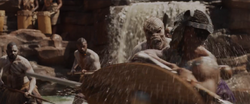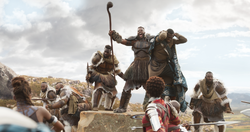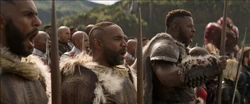No edit summary |
Tag: Visual edit |
||
| Line 40: | Line 40: | ||
==Cultural Traits== |
==Cultural Traits== |
||
| − | Jabari's traditional colors are brown and white. Their culture is based on woodworking and agriculture, that they crafted for thousands of years.<ref name="AoBP">''[[The Art of Black Panther]]''</ref>Unlike all the other [[Wakanda]]n tribes which incorporate advanced [[Vibranium]]-based technology into everyday life, the Jabari outright reject the use of Vibranium altogether, adhering staunchly to ancient, more primitive way of living. |
+ | Jabari's traditional colors are brown and white in honor of the White Ape.<ref name="MSVD" /> Their culture is based on woodworking and agriculture, that they crafted for thousands of years.<ref name="AoBP">''[[The Art of Black Panther]]''</ref> They were seen as masterful carpenters.<ref name="MSVD">[[Marvel Studios Visual Dictionary|''Marvel Studios Visual Dictionary'']]</ref>Unlike all the other [[Wakanda]]n tribes which incorporate advanced [[Vibranium]]-based technology into everyday life, the Jabari outright reject the use of Vibranium altogether, adhering staunchly to ancient, more primitive way of living. |
==Trivia== |
==Trivia== |
||
| − | *The Jabari are inspired by the {{WPS|Karo tribe}} of {{WPS|Ethiopia}} and the {{WPS|Dogon tribe}} of {{WPS|Mali}}.<ref name="AoBP"/> |
+ | *The Jabari are inspired by the {{WPS|Karo tribe}} of {{WPS|Ethiopia}} and the {{WPS|Dogon tribe}} of {{WPS|Mali}}.<ref name="AoBP" /> |
*The Jabari speak in a {{WPS|Yoruba}} dialect, as opposed to the {{WPS|Xhosa}} spoken by [[Wakanda]]ns from the [[Golden City]]. |
*The Jabari speak in a {{WPS|Yoruba}} dialect, as opposed to the {{WPS|Xhosa}} spoken by [[Wakanda]]ns from the [[Golden City]]. |
||
*[[Winston Duke]] describe the Jabari as people who ''"strongly believe that to move forward, you have to have a strong adherence and respect for the past. So they have a deep moral conscience."''<ref>[http://www.comingsoon.net/movies/features/872997-ryan-coogler-winston-duke-and-letitia-wright-talk-black-panther-at-comic-con#/slide/1 Ryan Coogler, Winston Duke and Letitia Wright Talk Black Panther at Comic-Con]</ref> |
*[[Winston Duke]] describe the Jabari as people who ''"strongly believe that to move forward, you have to have a strong adherence and respect for the past. So they have a deep moral conscience."''<ref>[http://www.comingsoon.net/movies/features/872997-ryan-coogler-winston-duke-and-letitia-wright-talk-black-panther-at-comic-con#/slide/1 Ryan Coogler, Winston Duke and Letitia Wright Talk Black Panther at Comic-Con]</ref> |
||
Revision as of 02:55, 28 October 2018
The Jabari Tribe, also referred to as the J'Abari or the Mountain Tribe, is a tribe consisting of Wakandans who shunned the use of vibranium and removed themselves from mainstream society. Adhering to traditional customs, which include worshiping the gorilla god Hanuman[1], the Jabari are staunch opponents of T'Challa's modernized rule and the Black Panther mantle.[2]
While initially enemies of T'Challa, they alongside their leader M'Baku later join forces with him to stop Erik Killmonger from enacting his plans and overthrowing him, upon learning he seized the throne. After the battle they become allies to the king when M'Baku is granted a seat in the Wakandan Tribal Council. Two years later, they would assist their king and the Avengers in the Battle of Wakanda, only for most of them to disintegrate, alongside their king when Thanos succeeds in his quest to obtain all the stones and use their power to destroy half of all life in the universe.
History
Early History
Millennia ago, the people who would later become known as the Jabari went to war with four other tribes over a meteorite made of an alien metal. When the warrior-shaman Bashenga brought an end to the conflict and united the tribes as the first King of Wakanda and the first "Black Panther".
While the other four tribes pledged their loyalty to Bashenga, the Jabari rejected the use of vibranium and went into seclusion, building a city in the mountains out of wood sacred to the ape god Hanuman.[3]
Challenging the Crown
During T'Challa's incoronation at Warrior Falls, Zuri offered all the Wakandan tribes a chance to put forth a warrior to challenge for the throne. Once all the tribes had declined, the Jabari Tribe, led by M'Baku, interrupted the ceremony, chanting and emerging from the fall's caves.

M'Baku challenged T'Challa for the throne and T'Challa accepted. The two fought using spears and shields while surrounded by the Jabari and the Dora Milaje. At the end of the battle, T'Challa managed to knock M'Baku down and pin him at the edge of the water fall. Not wanting to kill M'Baku, T'Challa urged him to yield, stating that the Jabari Tribe needed him, to which M'Baku gave in.[3]
Saving T'Challa's life
As repayment for sparing M'Baku's life during ceremonial combat, the Jabari fisherman took the severely wounded T'Challa and covered him in snow to stabilize his failing vital sign.[3]
Battle of Mount Bashenga
- "Witness the might of the Jabari... first-hand!"
- ―M'Baku to the Border Tribe[src]
T'Challa's mother Ramonda was permitted to stay in Jabari Land for her safety once T'Challa had recovered. T'Challa then announced his intention to take back the throne from Erik Killmonger, requesting aid from the Jabari Tribe, however M'Baku refused to help T'Challa, pointing out that no Wakandan king had even come to Jabari Land in centuries.

M'Baku leads the Jabari into battle
Eventually realizing the fate of Wakanda was on the line, M'Baku decided to organize the Jabari warriors and head to Mount Bashenga, aiding the Dora Milaje where M'Baku lifted one of the Border Tribe foot soldiers and threw him into the force field.
Following their victory over Killmonger's forces, M'Baku joined the Tribal Council, finally giving the Jabari a voice in governing Wakanda.[3]
Battle of Wakanda

The Jabari Tribe prepare for the Battle of Wakanda
The Jabari joined with the force of the Wakandans that formed to battle those of Thanos and fought in the Battle of Wakanda, being led by M'Baku. Following their defeat at the intergalactic warlord's hands, many of them disintegrated alongside their king with M'Baku being one of the survivors.[3]
Cultural Traits
Jabari's traditional colors are brown and white in honor of the White Ape.[4] Their culture is based on woodworking and agriculture, that they crafted for thousands of years.[5] They were seen as masterful carpenters.[4]Unlike all the other Wakandan tribes which incorporate advanced Vibranium-based technology into everyday life, the Jabari outright reject the use of Vibranium altogether, adhering staunchly to ancient, more primitive way of living.
Trivia
- The Jabari are inspired by the Karo tribe of Ethiopia and the Dogon tribe of Mali.[5]
- The Jabari speak in a Yoruba dialect, as opposed to the Xhosa spoken by Wakandans from the Golden City.
- Winston Duke describe the Jabari as people who "strongly believe that to move forward, you have to have a strong adherence and respect for the past. So they have a deep moral conscience."[6]
References
- ↑ Collider Videos - Black Panther Cast on Working with Ryan Coogler and Watching the Trailer
- ↑ M'Baku Profile
- ↑ 3.0 3.1 3.2 3.3 3.4 Black Panther
- ↑ 4.0 4.1 Marvel Studios Visual Dictionary
- ↑ 5.0 5.1 The Art of Black Panther
- ↑ Ryan Coogler, Winston Duke and Letitia Wright Talk Black Panther at Comic-Con

